View from the 5th – December 2014

December 2014 – New roles for HSL librarians
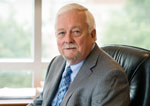
As the fall semester comes to a close, it’s important for us to stop and reflect on the year we’ve had. This was truly a transformational year for the HSL, as we continue to take on new roles to better serve our constituents in an ever changing research environment, make staffing and space changes, and add new partners.
Our librarians had several unique opportunities to expand both their skills and the areas where they work this fall. This spring, we’ll formally launch the Research Hub @ HSL, a collaborative effort among UNC Libraries to enhance our active support of the research lifecycle – pushing us into new roles as informationists, data managers and partners to faculty, staff and students in their research. The Ebola epidemic hit home this fall and our librarians played an integral role in informing the UNC Community. Finally, our librarians and staff have continued to step into roles to serve the greater North Carolina community by giving back to those in need.
Taking on new roles and altering the way we think about the work we do would not be possible without the generous private giving of our Friends. Thank you for the financial flexibility your support has given us this year, and every year.
Sincerely,
Jim Curtis
Interim Director, Health Sciences Library
Ebola: Ensuring an informed Carolina community
HSL launches Research Hub
If you’ve been to the HSL lately, you may have noticed some changes. We’re not just giving the furniture and study spaces a facelift; the HSL has been preparing to launch its location of the Research Hub and gearing up to offer a new set of resources for Carolina researchers.
The Research Hub is a collaborative effort of the Davis, Kenan Science and the Health Sciences Libraries to extend support services for researchers, students, and faculty to every stage of their research process – from refining a research question to conducting custom searches and from finding grant funding to assessing their own research impact.
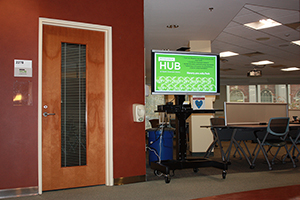
Barrie Hayes, liaison librarian for Bioinformatics and Translational Science, has led the Research Hub @ HSL project from the early planning stages in 2013.
“Providing active support throughout the research lifecycle is a goal of our current strategic plan,” Hayes said. “That support is especially important to the HSL’s user community because they typically bring in about 75 percent of the campus’ total research dollars year after year. We believe the Research Hub will take their already impressive ability to bring in funding to the next level.”
The current focus of the Research Hub is to expand librarian skills to better meet the needs of researchers in areas like systematic reviews, data visualization, and publishing compliance with federal mandates like the NIH Public Access Policy. Several new courses will soon reflect these growing areas of expertise and be offered in person and online.
“Increasing our focus on supporting the research process further aligns us with the national trend of librarians taking an active role in research,” Hayes said. “We hope that this change in focus will allow us to influence the perception of our library from a place that collects the materials of research to an essential partner in the research process.”
The renovation plans focused on providing flexible, technology-enabled spaces for groups and teams, particularly from the health sciences. The library installed new software and video/web conferencing capabilities to better support collaborative work across and beyond the university.
When researchers work with a Research Hub librarian, they can take advantage of our network of partners and a better-connected library system of referrals. Several partners have joined the Research Hub including the Howard W. Odum Institute for Research in the Social Sciences, the Center for Faculty Excellence, the North Carolina Translational and Clinical Sciences Institute, the Carolina Health Informatics Program and REACH NC. Hub Partners can now offer more classes and services in collaboration with the libraries and showcase what they have to offer to Carolina researchers.
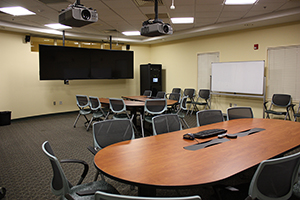
The HSL will celebrate the Grand Opening of the Research Hub in early March (date to be announced soon). Attendees will have the chance to meet HSL Hub librarians and our distinguished partners, see demonstrations of the new equipment and technology, and learn how the Research Hub plans to make the research enterprise at Carolina more connected, collaborative, and effective.
Ebola: Ensuring an informed Carolina community
From simulating the experience of providing heath care while in Ebola protective gear to talking about the disease with community members and students in a Town Hall forum, Nursing Liaison Librarian Elizabeth Moreton and several HSL librarians served in an integral capacity in the campus-wide response to prepare for potential Ebola cases locally.
Shortly after the first cases of Ebola became apparent in the United States a response team was formed in the School of Nursing (SON) that included Moreton. The team moved quickly to arrange a town hall event, and gather sound resources for practitioners. Susan Swogger, collections development librarian at the HSL, other library staff and faculty in the SON worked collaboratively to develop a guide that provided resources pertinent to health care providers.
“Students, faculty, staff, and our administration in Nursing were curious about Ebola and what this meant for UNC and our community,” said Carol Durham, EdD, RN, ANEF, FAAN, clinical professor of nursing and director of the Education-Innovation-Simulation Learning Environment (EISLE). The team worked quickly to start the conversation and provide information to the UNC community.
Simulation
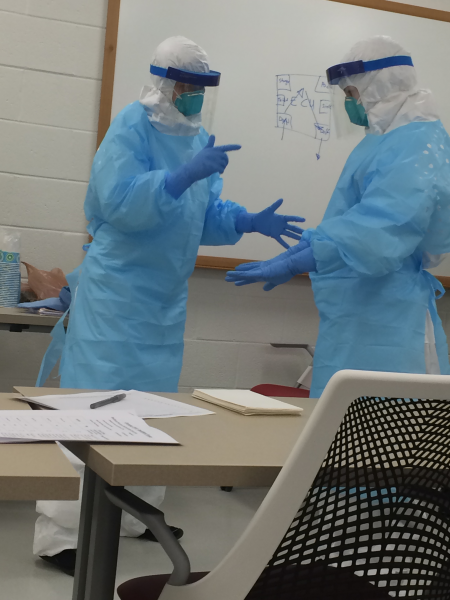
At the same time, Nursing collaborated with the School of Medicine (SOM) to develop an Ebola-specific simulation that brought together practitioners from different disciplines and would eventually serve as a pilot for UNC Hospital’s targeted training program, which Mellanye Lackey (pictured left), liaison librarian for public health and global health and Moreton attended. Benny Joyner, an assistant professor of pediatrics and anesthesia and Director of the Clinical Skills and Patient Simulation center at the SOM, William Fischer II an assistant professor at the SOM and Carol Durham, collaborated with their healthcare partners to prepare health care providers for caring for patients with Ebola. Beyond refining skills while working in personal protective equipment (PPE), Drs. Joyner and Durham integrated their expertise in simulation, teamwork, and collaboration.
“We all have a vision of what a simulation is, but because we have limited exposure, we may not fully understand its benefit until we see it,” Durham said. “Sometimes I think we know what other medical professionals do, but we don’t know the depth and breadth of their expertise until we’re in the simulation or clinical environment.”
Simulation is part of a growing goal to foster more opportunities for inter-professional education, or bringing students and practitioners from different clinical professions together to train in the field.
“It was interesting to see the actual problems with wearing the PPE while caring for patients,” Moreton said. “Attending simulations and working directly with health care practitioners is important not only for health care workers to have the information they need, but important for us as librarians to understand what they are going through and how we can help.”
In this case, both the librarians, nursing and medicine faculty, and health care system were able to use the simulation to inform their work.
“This type of collaboration raises our own performance because we have a partner with knowledge resources to make the best information more available, vetted and at our side,” Durham said. “It is helpful to have a knowledge manager on your team to bring forward the latest evidence and survey the environment while faculty and practitioners focus on patient care and education. Working with librarians allows us to stay up to date and it is reassuring that someone is providing quality support.”
Town Hall

Several weeks later, the group hosted a town hall meeting that was open to everyone in the UNC Chapel Hill community. The event was attended by a variety of students and professionals who were interested in learning about the disease and asking questions.
Among the list of speakers were Dr. William Fischer II, an assistant professor the UNC School of Medicine, who shared his firsthand experience with treating the disease following a recent trip to Guinea as part of Doctors Without Borders; Rumay Alexander, EdD, RN, FAAN, who discussed how fear can dominate our behavior or reactions to situations like the Ebola crisis; and Dalton Sawyer, director of emergency preparedness and continuity planning at UNC Health Care, discussed emergency preparation. Drs. Durham and Joyner discussed the simulation. Moreton was able to consult in the planning of the event and help produce bookmarks and slides with health information for attendees.
“I thought that there was a real openness and collaboration between the community, health affairs groups, UNC hospitals and the Health Sciences Library,” Durham said. “Everybody is trying to be prepared.”
Library Curated Resources
The final task of the Ebola response team was to quickly prepare a resource guide to share pertinent resources with health care staff, faculty, and interested students.
Swogger selected evidence-based resources for the clinical environment in North Carolina, rather than international or consumer-focused information. Because Ebola information was constantly evolving, Swogger, Moreton, Durham, HSL librarians, and faculty collaborated on the guide to ensure that the resources, news, and factual information were consistently updated.
“There’s usually too much information for most practitioners to sift through, so if we present a few pages with clearly defined boundaries and they find information they need, they might come to us more in the future with information needs,” Moreton said. “And, we have fun when we get to interact with the people we serve.”
The guide is organized around the “Detect, Protect, Isolate, and Respond” method, which expands up the “Ask, Isolate, and Call” procedure used at UNC Hospitals. It includes tools, courses, and current news specifically for practitioners who could encounter patients with Ebola in the United States.
“I cannot tell you how impressed I was with how quickly the librarians developed the guide and how responsive they were to our initial conversations,” Durham said. “The librarians vetted the information and put it together in a way that made it accessible to people and ensured that it was broad enough for all types of learners with up-to-date video, webinars, and news articles. It’s a very powerful resource.”
“I’m grateful to have such active librarians and such a rich resource in the library,” Durham added. “We’re really fortunate…I hope that this will help people to understand that the library is not just a building, it is a vibrant place with people that can contribute to our work a meaningful way.
HSL gives back
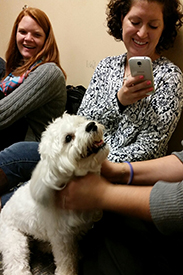
The end of semester means that the library is doing its best to ease the stress of our students by staying open longer hours, bringing in dogs and cats as part of Animal Therapy, and offering free coffee for late-night studiers, an amenity that is sponsored by our Friends of the Library, the Friends’ Café and the HSL. But that’s not all – our staff has done their part in thinking beyond our Health Affairs community to help others in need this holiday season.
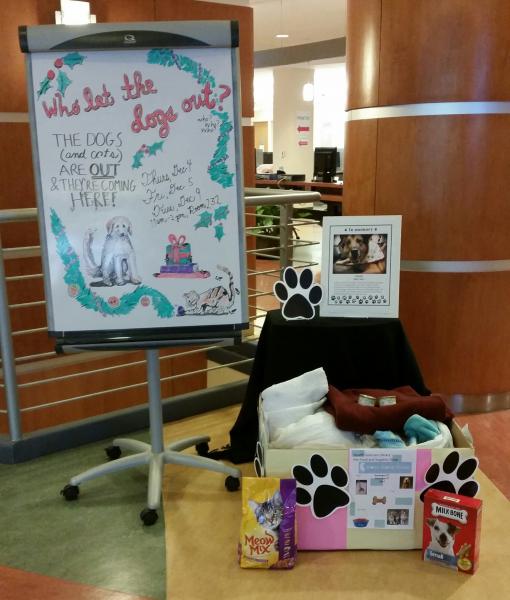
- Book Drive: The HSL housed a collection box for the annual Book Fairy Book Drive, which in total gathered 1,665 books for the Pediatric Oncology Clinic at UNC Children’s Hospital. The drive is sponsored by University Libraries.
- Pet Supplies Drive: The library is currently collecting pet supplies for Hope Animal Rescue in Durham until Friday, Dec. 19.
- Bake Sale: Library staff participated in a bake sale that raised $386 for Carolina Cares Carolina Shares, the state employees combined campaign.
- Food Drive: The Inter-Faith Council invited HSL staff to donate non-perishable foods, personal care items and financial donations as part of their Winter Food Drive. So far, staff have donated $50 and a box of non-perishable food items.
Wishing you a safe and happy holiday season and a healthy and Happy New Year from all of us at the Health Sciences Library. Thank you for your generous support this and every year.






